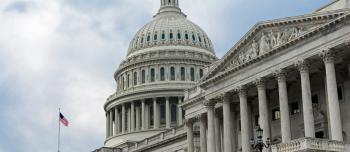Government Relations Update – June 2024
Welcome to the National Bleeding Disorders Foundation's monthly Government Relations Update. This section provides timely and essential information on federal and state policy developments affecting the bleeding disorders community. From legislative progress on crucial appropriations bills to the latest election updates and advocacy efforts, we aim to keep you informed about the issues that matter most. Stay tuned for detailed insights and actions NBDF is taking to ensure that the voices of those affected by bleeding disorders are heard at all levels of government. Read more about our advocacy efforts.
Federal
FY 2025 Appropriations: Congress is working its way through the fiscal year (FY) 2025 appropriations process. Most notable for the bleeding disorders community is the Labor, Health and Human Services, Education, and Related Agencies bill (better known just as L-HHS), which includes the funding for the federal hemophilia programs. While the proposal includes cuts to the Centers for Disease Control and Prevention (CDC), more details will be released, and multiple changes are likely as it moves through the House and the Senate.
2024 Election: We are about halfway through the 2024 primary season gearing up for November when there are 468 seats in the U.S. Congress up for reelection (all 435 House seats and 33 Senate seats). A number of high-ranking House members who are leaders on health care policy are retiring from Congress this year. Notably, Rep. Cathy McMorris Rodgers (R-WA-5) who currently chairs the House Energy and Commerce (E&C) Committee, E&C Health Subcommittee ranking member Anna Eshoo (D-CA), Rep. Larry Bucshon (R-IN), a physician, who made health policy a focus of his time in Congress, and Rep. Michael Burgess (R-TX) the second highest ranking Republican on E&C behind McMorris Rogers. Burgess is also a physician, who voted to repeal the Affordable Care Act more than 50 times, according to his web site.
Copay Accumulator Adjusters and Alternative Funding: NBDF joined a letter led by the All Copays Count Coalition (ACCC) to the U.S. Departments of Health and Human Services (HHS), Labor (DOL), and Treasury, requesting that the agencies implement policies that guarantee copayments made by or on behalf of an enrollee are counted toward their annual cost-sharing obligation. The agencies have indicated that a future rule is coming.
NBDF also joined a letter led by the Alternative Funding Task Force which also went to HHS, DOL and Treasury. This letter requested that the agencies include policies in their upcoming rule which would help to end the practice of alternative funding programs, which typically occur when a health plan does not cover an entire category of prescription drugs or implements an incredibly burdensome prior authorization process in order for an individual to access needed medications.
State
California: NBDF and the Hemophilia Council of California joined other rare disease advocates from around the state in an Advocacy Day in Sacramento organized by the National Organization for Rare Disorders to gain legislative support for AB 2613 which would establish a Rare Disease Advisory Council. Twenty-eight states have created similar councils, Mississippi most recently.
New Hampshire: SB 354, the state’s copay accumulator ban legislation, failed to make it out of conference committee prior to the legislature ending for the session. Bleeding disorders advocates from the New England Hemophilia Association testified in support of the legislation.
New York: A901A, the state’s step therapy reform legislation, was passed by the Assembly this month after multiple legislative sessions of being stuck in the state Senate. The New York State Bleeding Disorders Coalition (NYSBDC) helped lead this effort for many years.
North Dakota: The legislative Employee Benefits Program Committee voted to allow draft copay accumulator adjuster legislation to be considered during the 2025 legislative session. However, the committee’s analysis of the draft bill yielded an $8.6 million fiscal note for the bill’s estimated impact on the state health plan.
The Bleeding Disorders Alliance of North Dakota and NBDF met with key North Dakota legislators June 2 to discuss the 2025 legislative process and prospects for a CAAP bill. Of note, any health care-related bill that is enacted only applies to the state employee health plans where it is studied for two years. After the two-year study the legislature would again need to pass the bill to apply it to fully insured commercial plans.
BDAND and NBDF also met with an official from the state Insurance Department June 25 to discuss the draft CAAP bill, the particulars of the grandfathered state employee health plan, and the possibility of the state issuing guidance to fully insured plans enforcing the federal 2020 Notice of Benefits and Payment Parameters’ ban on CAAPs.
Oregon: The state’s Prescription Drug Affordability Board has distributed to patient advocacy organizations a survey on the potential impact of Upper Payment Limits to patient access to care. The survey deadline is June 30. NBDF submitted its response to the survey.
Rhode Island: On June 25, Gov. Dan McKee signed into law HB 7365, which protects patients from “white bagging”, the practice which allows insurers to require patients to get their medication from one specific insurer-affiliated pharmacy.
HB 8041, Rhode Island’s CAAP ban legislation, did not make it out of legislative study before the legislative session this month.





